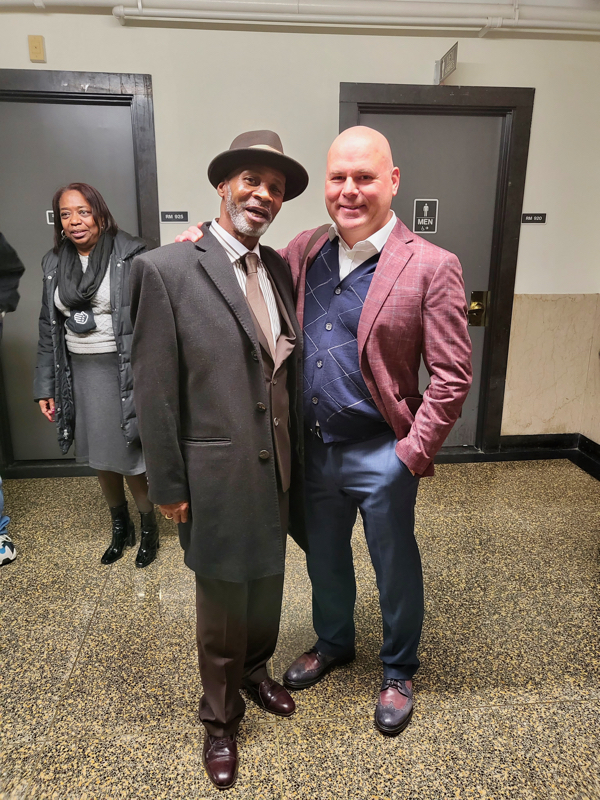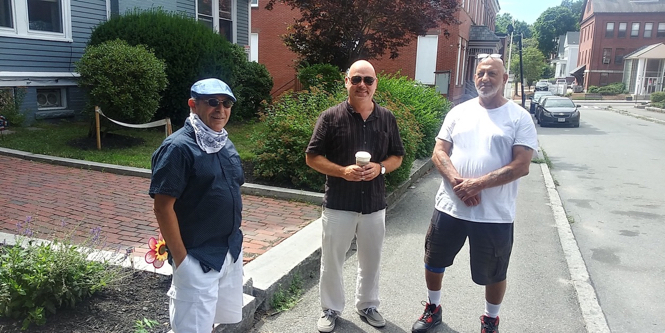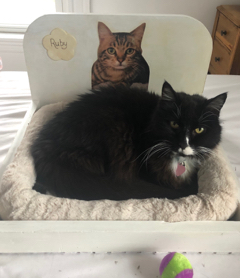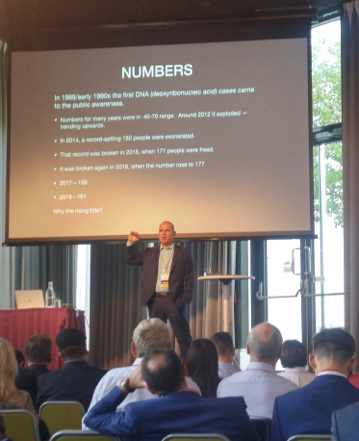criminal defense
Judge tosses out Raymond Gaines' 1976 murder conviction...
Dec.22.2022
This one came unexpectedly at the end of December, and we are trilled to see Ray Gaines out and about Boston (and shopping at the same hat shop as the owner of this PI firm). Ray's case involves a critical and disturbing juncture of Boston.
Gaines was sentenced to life in prison for the 1974 armed robbery and murder of Peter Sulfaro, the owner of a shoe repair shop in Roxbury. The defense investigation showed the witness identification of Gaines was "...the result of unduly suggestive police procedures". Errors included multiple viewings of photo arrays; police telling a witness he "picked the wrong people" - and then showing the same array with only the new suspects added. Newly discovered Brady material including Boston police records showing Det. Peter O'Malley arrested "drug shooting gallery" operator David Bass even while securing Bass's false affidavit (Bass faced criminal charges even while testifying against Gaines). Bass himself later recanted his testimony against Gaines in 1990. "The Commonwealth did not disclose the Bass affidavit for nearly 30 years--despite its obligation to do so."

Gaines was sentenced to life in prison for the 1974 armed robbery and murder of Peter Sulfaro, the owner of a shoe repair shop in Roxbury. The defense investigation showed the witness identification of Gaines was "...the result of unduly suggestive police procedures". Errors included multiple viewings of photo arrays; police telling a witness he "picked the wrong people" - and then showing the same array with only the new suspects added. Newly discovered Brady material including Boston police records showing Det. Peter O'Malley arrested "drug shooting gallery" operator David Bass even while securing Bass's false affidavit (Bass faced criminal charges even while testifying against Gaines). Bass himself later recanted his testimony against Gaines in 1990. "The Commonwealth did not disclose the Bass affidavit for nearly 30 years--despite its obligation to do so."

Who says there are limits?
Sep.11.2020
Who says there are limits? Limits on what you achieve? With friend & client Victor Rosario, free after 32 years; Tony Mazza, free after 47 years. Truth, faith, strength, hope ... Outlast the injustice.
By the way, Victor makes handmade wood cat boxes, call us to order one from him. 🔝😺


By the way, Victor makes handmade wood cat boxes, call us to order one from him. 🔝😺


John Nardizzi presented at WAD 94th Annual Conference Stockholm Sweden
Aug.31.2019
John Nardizzi spoke about wrongful convictions at the World Association of Detectives 94th Annual Conference in Stockholm, Sweden. Headcount of raucous crowd shows Mr. Nardizzi outdrew ABBA tribute band.
"Breaking up is never easy, I know, But I have to go
Knowing me, knowing you It's the best I can do…"


"Breaking up is never easy, I know, But I have to go
Knowing me, knowing you It's the best I can do…"


The Law and Science of Eyewitness Identification
Jun.11.2017
I summarized some key points for investigators in a piece for PURSUIT MAGAZINE on the new scientific studies being done in the field of eyewitness identification and memory.
Below are links to case law, scientific studies and law enforcement training guides and videos. Most of this collection was put together by the organizers of the National Symposium on Eyewitness Identification Reform held at Yale Law School, which I was fortunate to attend in July 2016.
- John Nardizzi
Court Cases
Law Enforcement Training Curriculum
Law Enforcement Videos
Model Legislation, Policies and Practices
Related Studies and Articles
1982 Lowell arson conviction may be reconsidered
Jun.27.2010
The Boston Globe did a piece on flaws in an arson investigation that led to the conviction of N&A INC client Victor Rosario. An appeal is being filed.
Court of Appeals Reverses Conviction of client Michael O'Laughlin
Jun.11.2009
In a rare decision upholding a lower court decision overturning a jury verdict, the 1st Circuit Court of Appeals overturned the Massachusetts Supreme Judicial Court [SJC] in the murder case of client Michael O'Laughlin. Citing the "the extremely high bar " in such instances, the court found in part: "Taken together, the circumstantial evidence in this case, even when drawing all reasonable inferences in favor of the prosecution, does not permit any rational jury to conclude that O'Laughlin was the assailant beyond a reasonable doubt." The opinion is notable for its thorough parsing--and ultimate rejection-- of the consciousness of guilt evidence cited by the SJC.
The court summed up the case as follows:
"A Massachusetts Superior Court jury had convicted O'Laughlin of the following counts: (1) burglary and armed assault in a dwelling; (2) armed assault in a dwelling; (3) armed assault with intent to murder; and(4) assault and battery by means of a dangerous weapon. The Superior Court then sentenced O'Laughlin to 35-50 years on Counts One and Two; 19-20 years on Count 3; and 9-10 years on Count 4, ruling that the sentences were to be served concurrently.
The intermediate Massachusetts Appeals Court reversed the judgments holding that there was insufficient evidence to support the verdicts. Commonwealth v. O'Laughlin, 830 N.E.2d 222 (Mass. App. Ct. 2005) (hereinafter "O'Laughlin I"). The Massachusetts Supreme Judicial Court ("SJC") reinstated the judgment reasoning that there was sufficient evidence to support the verdicts. Commonwealth v. O'Laughlin, 843 N.E.2d 617 (Mass. 2006) (hereinafter "O'Laughlin II").
O'Laughlin filed a petition for a writ of habeas corpus in the United States District Court for the District of Massachusetts on grounds that (1) the SJC's (which had ruled that was objectively unreasonable because there was insufficient evidence to support a guilty verdict and (2) that the SJC violated his constitutional right to present a defense. The district court denied O'Laughlin's petition for habeas relief.
After careful consideration, we reverse the judgment of the district court and order the district court to grant the petition. "
A full factual recounting of the case is found here. Michael remains in prison pending a state appeal for an en banc hearing by a full panel of 1st Circuit judges.
The court summed up the case as follows:
"A Massachusetts Superior Court jury had convicted O'Laughlin of the following counts: (1) burglary and armed assault in a dwelling; (2) armed assault in a dwelling; (3) armed assault with intent to murder; and(4) assault and battery by means of a dangerous weapon. The Superior Court then sentenced O'Laughlin to 35-50 years on Counts One and Two; 19-20 years on Count 3; and 9-10 years on Count 4, ruling that the sentences were to be served concurrently.
The intermediate Massachusetts Appeals Court reversed the judgments holding that there was insufficient evidence to support the verdicts. Commonwealth v. O'Laughlin, 830 N.E.2d 222 (Mass. App. Ct. 2005) (hereinafter "O'Laughlin I"). The Massachusetts Supreme Judicial Court ("SJC") reinstated the judgment reasoning that there was sufficient evidence to support the verdicts. Commonwealth v. O'Laughlin, 843 N.E.2d 617 (Mass. 2006) (hereinafter "O'Laughlin II").
O'Laughlin filed a petition for a writ of habeas corpus in the United States District Court for the District of Massachusetts on grounds that (1) the SJC's (which had ruled that was objectively unreasonable because there was insufficient evidence to support a guilty verdict and (2) that the SJC violated his constitutional right to present a defense. The district court denied O'Laughlin's petition for habeas relief.
After careful consideration, we reverse the judgment of the district court and order the district court to grant the petition. "
A full factual recounting of the case is found here. Michael remains in prison pending a state appeal for an en banc hearing by a full panel of 1st Circuit judges.